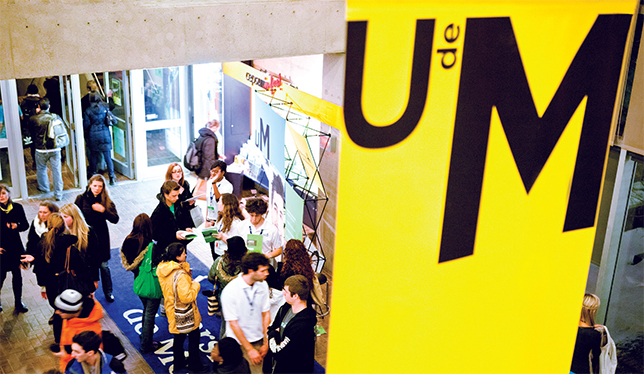At the turn of the millennium, Maha Berechid was attending a French-language high school in Morocco and dreaming of studying at a foreign university. She soon settled on Montreal. “I wanted to study in French, in a reputable university,” she says. “Montreal is a safe, calm, affordable city with a lot of appeal. Plus, English is the second language there and I wanted to learn it as well.”
After two years of undergraduate study in Montreal, the idea of settling down in the city began to form in her mind. “I felt happy in Montreal and I could see myself spending my life here,” she says. “I’d gotten used to the pace and feel of a major North American city, different from those in North Africa. Above all, I had good professional prospects.”
Today, at 33 years old and with a master’s in economics from Université de Montréal, Ms. Berechid is a Canadian citizen and holds a position with the City of Montreal.
If it were up to the Quebec government, stories like Ms. Berechid’s would increase exponentially. Quebec’s population is the fifth oldest in Canada, outdone in seniority only by the four Atlantic provinces. In 2015-16, its population grew only 0.8 percent – below the national average for the fifth year in a row, according to Statistics Canada.
“Quebec needs to attract immigrants to fill its demographic needs,” says Christian Bernard, vice-president, strategy and communications, at Montréal International. “There are plenty of international students already living in Quebec, and many of them speak French. They are highly qualified and have no problem having their degrees recognized.”
In October 2016, the Quebec government invested $1.6 million over the course of three years in MI’s “I choose Montréal” program, aimed at tripling the number of international students who stay in the region after graduation. A similar mandate was given to Québec International in March 2017 for Quebec City and the Chaudière-Appalaches region south of the city. The Quebec government followed that up in May with an $85,000-grant to Sherbrooke Innopole to entice international students to study in the Eastern Townships region and to remain there following their studies.
A recent study by the Institut du Québec, carried out in partnership with the Conference Board of Canada and HEC Montréal, highlights three obstacles the province must overcome to claim success in retaining international students.
Learning the French language – a requirement for permanent residency – is the first major difficulty for non-francophone students. The Quebec government is keenly aware of this issue and now offers students and residents free French language training online, a service that was previously reserved for approved immigrants.
Knowledge of the immigration process and access to employment are the two other stumbling blocks. “Quebec’s Programme de l’expérience québécoise, a fast track to permanent residence for future graduates, has been available since 2010,” explains Kareem El-Assal, author of the Institut du Québec study. “From 2011 to 2015, the number of Quebec selection certificates awarded to foreign students under this program tripled, from 1,126 to 3,512.”
But more is needed. “If foreign students fail to find work after their studies, they leave,” warns Mr. El-Assal. “We have to encourage more employers to hire them immediately after they graduate. Too many companies hesitate, afraid that the students will leave Quebec or get bogged down in complex administrative red tape.”
The first step in keeping more foreign students in Quebec would be to attract more of them. The number of international students enrolled in Quebec universities increased by 72.7 percent in Quebec from 2004-05 to 2014-15, whereas it jumped 102 percent in Ontario and 207 percent in British Columbia, according to StatsCan.
Quebec lags behind other provinces partly because French-language universities in Quebec recruit mainly from francophone countries, while English-language institutions benefit from a massive intake of Asian students, particularly from China and India. In 2016, close to 60 percent of international students at Université de Montréal came from France, compared to 4.2 percent from China. At McGill University, approximately 18 percent come from China and 16 percent from France.

Guy Lefebvre, vice-rector, international affairs and la Francophonie at Université de Montréal, admits that his university is seeking to diversify the countries that students come from. He particularly has Brazil, China and Peru in his sights.
“From our point of view, the contribution made by foreign students is primarily academic. It’s a matter of providing Quebec students with an international campus. You know, only seven percent of Université de Montréal students from Quebec will go on to study abroad. For the remainder, overseas contacts are made and international networks are formed here in Quebec.”
“And that’s not to mention the support we get from these students after they graduate,” adds Jocelyne Younan, associate registrar, undergraduate recruitment and communications, at McGill University. “Some stay in Quebec, but most forge careers in other countries. They become ambassadors, helping McGill recruit new foreign students or develop interesting projects.”
Quebec universities also help each other raise the province’s profile, particularly through the Destinations universités Québec website. “We collaborate to promote Quebec’s image and optimize our resources,” says Ms. Younan. “Working together, we can attract increasing numbers of international students to come here.”
These efforts seem to be bearing fruit as the rankings company Quacquarelli Symonds recently named Montreal the best city in the world for international students for 2017, overtaking Paris, which had held the top spot for the previous five years.